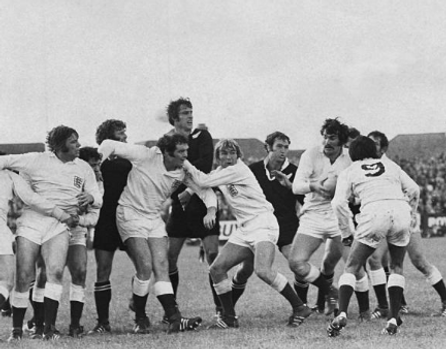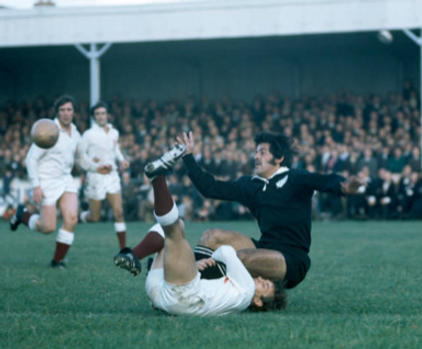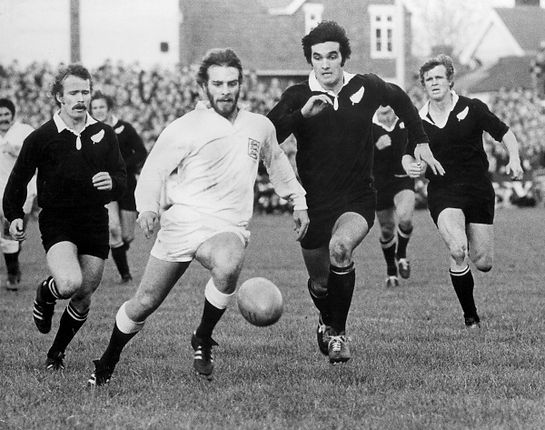
NECTAR & TWIGGY
1. WESTERN COUNTIES
At the official first press conference on Monday 23rd, Captain Kirk and Bobby Duff were happy to leave Ernie Todd to field questions from the British press, which he did with some considerable aplomb. In fact, TP stated that he'd never witnessed as good a showing from an NZ rugby man at a press conference, Todd being jovial and full of wit and humour, even offering his official managerial position when questioned; there would be no curfew for the men in black.
J B G 'Bryn' Thomas wanted to know if it would worry Todd if the AB's, while concentrating on the test matches, lost a few provincial games on tour. "Certainly," replied Todd. "I'm a bad loser."
The press conference was followed by a magnificent luncheon at the Savoy Hotel by the British Sportsmen's Club (with 500 guests of every possible distinction in sporting backgrounds), with a reiteration from Chairman, the Duke of Norfolk, that " the word politics will never be used where we are concerned." The team had its first training session at the Athletic Ground in Richmond, south-west London the same afternoon (and again on Tuesday).



The All Blacks first two training runs at Richmond created much media interest on October 23rd and 24th. At this early stage of proceedings, Bob Duff, Kirky and Keefy can even afford a smile.
A most unsavoury incident occurred on the Monday evening that would have serious ramifications for the remainder of the tour, unfortunately coming so soon as it did, the tour having only really begun in earnest. The AB's were guests of the Four Home Unions at a formal, welcoming dinner at their hotel. Ernie Todd, entering the foyer of the Britannia from Grosvenor Square, spied a group sitting in a circle, which consisted of Murdoch, Sutherland, Wyllie, Toby Macdonald and Moose Whiting.
With a fixed look on his face, he moved into the group and began offering it's members (Murdoch particularly, but also Wyllie and Sutherland) ultimatums regarding infraction of discipline, which would in turn be dealt with by the severest of punishments - expulsion from the tour.
Todd mentioned his disapproval of Wyllie's rugged approach to the game, an unfortunate incident involving Sutherland during the internal tour earlier in the year and another in South Africa in 1970, which had involved Murdoch. Keefy had gotten into a fight with the Springbok Piet Visagie, or some of his mates and severely injured an ankle which sidelined him for several weeks.
"It was disgraceful. What Todd did ended our respect for him. After that, we mostly ignored him."
Hamish Macdonald (They Missed the Bus) 1973
"No-one's ever told the truth about it. Ernie Todd was dying of cancer. He was a bit of a nightmare. Hell of a nice guy, but the man's dying of cancer. But we were never told, if we were we may have had a more sympathetic view. Unfortunately he drank too much and he said a few words he shouldn't have. We weren't kids. You don't come in and abuse guys, some of us had families, we actually knew how to behave, we always were responsible."
Alan Sutherland (Stuff, Peter Jones, 2013)
Alan Sutherland particularly was incensed by the act. Keefy expressed disappointment that he'd been picked on and that he hadn't even had a chance as yet. He told Todd that if he didn't want him on the tour, he'd go straight away. He couldn't see the point of staying and playing/touring under a cloud.
But it wasn't just Ernie Todd. Simultaneous with the All Blacks arrival in the UK, Keith Murdoch was already being portrayed in the press as the 'wild man' and the knives were seemingly out for the gentle giant from Ravensbourne on the Otago peninsula. British speculation seemed preoccupied with the notion that Keefy was a caged Gorilla.
It was seemingly unorthodox for them to accept that just such a neanderthal had not the intelligence of the Irishman Ray McLaughlin, nor the bravado of Barry Llewellyn, the alleged strong man of Welsh rugby. Keefy was just a ticking time-bomb and they were hell bent on lighting the fuse.
It was Sully who offered the group involved an ultimatum of his own. "We'll play like buggery and show this joker up," he said. "We'll make the bastard eat his words!"
Tuesday's training session was followed by a reception for the All Blacks at Jeff Butterfield's newly-established Rugby Club - a reception tendered them by the well-to-do Rugby Writer's Club, which included Danny Hearn (who was paralysed attempting to tackle Ian MacRae in a match at Leicester in 1967) and the great Welsh fly-half, Cliff Morgan, recovering from a recent stroke.
Another parochial Welshman and rugby fan, the great British actor Richard Burton, had in fact offered to help with Morgan's recuperation, by offering to pay his medical expenses. It is said that Morgan folded the letter into his heart and while he did not accept the actors offer, he knew he had but to ask and Burton would have given him the earth. Such is a Welshman's passion for the sport and why - post this particular tour - New Zealanders and Welshmen have such a deep respect for one another.
On Wednesday, the NZ High Commissioner welcomed the team to the UK and the following day they set off by coach from London along the M4 & M5 for Cheltenham, in preparation for their first match against Western Counties. The All Blacks would be transported around the British Isles by T. H. Hamer and Company of London, the usual contractors for rugby tours through the UK.
Besides the New Zealand contingent of 32, three others constantly travelled on the coach with the team; RFU Liaison Officer, Stanley Couchman, baggage master (and general factotum) Graham Short and Ted Howard, the managers secretary.
Couchman had played for the Old Cranleighan's club, made 46 appearances for county Surrey and was an uncapped Lion on the 1938 tour to South Africa. He would become the RFU President in 1977-78.
A second coach that travelled with the team contained seven pressmen (five writers and two photographers) from New Zealand. Included in this illustrious group - TP and his NZ Herald contract aside - Bob Howitt (editor of Rugby News and the New Zealand Rugby Annual) and Hedley Mortlock (sports editor of Truth) and with him, the doyenne of Kiwi sports photographers, Peter Bush.
At Cheltenham, Alan Sutherland - acknowledged as another of the team’s humorists - was appointed the touring party judge for the weekly mock-court sessions, a tradition in which players and press were fined for various misdemeanours committed during the week.
On Friday 27th, the All Blacks trained at the Cheltenham club, where the 1905 side had played and won by 18-0. Harold 'Bunny' Abbott ran in three tries, as he had against Hartlepool clubs and Munster. Showing scant regard for the history component, Andy Haden proceeded to smash one of the crossbars, when he booted the ball into it. Sid Going sprained an ankle at the training session, but because there was no ice on hand, the ankle swelled up more than it should have. By chance, this would play exactly into the AB's hands the following afternoon.
Then it was down to the very serious business...a rugby tour of the United Kingdom and France. Vivian Jenkins had already warned that the All Black's initial schedule in the UK was going to be a tough assignment and - with a combination of the '71 Lions success in NZ, modern coaching techniques and just being plain English - they were warned of an imminent defeat in match one.
The first engagement was indeed a tough prospect, a regional side made up from the Western Counties of England, which included many players from the 1971–72 Rugby Union County Champions, Gloucestershire. For the record, although they only had three members listed in the replacements, Somerset was the only other county included in 'Western Counties'.
Gloucestershire were the crowned English county champions, having defeated Warwickshire in the final in Coventry in March, by 11-6. To further boost rugby union in England, the RFU had introduced (in 1971) the John Player Cup, a knock-out competition, which quickly emerged as England’s premier Rugby Union club competition event (with there being no official league table for clubs). The first final, held on April 29th, 1972 was also won by Gloucester, defeating the Jan Godfrey Webster (1946-2019) led Moseley side from the West Midlands by 17-6.
The Western Counties side to face the All Black's included seven players from the Gloucester club, six of whom had played the John Player Cup Final, four of them also playing in the county final. Bristol were the other club side well represented, seven also. Half-back, John Cannon from Clifton was the only player not to come from either Bristol of Gloucester.
Bristol, beaten finalists in the 1972-73 JPC final, had amongst their ranks, 1971 Lions hooker, John Vivian Pullin (1941-2021) (also the current England captain), No. 8, Charlie Hannaford, who had won three caps in the 1971 Five Nations series, Alan Morley, who had made his test debut, scoring the games only try in England's big upset 18-9 win over South Africa in Johannesburg in June and the man who would captain Western Counties, Dave Watt.
Gloucester would provide prop Mike Burton, also a member of the winning team in SA, later to return to the Republic with the 1974 Lions, plus Robin Cowling, Alan Brinn, Dick Smith, John Watkins and John Bayliss of the JP Cup winning side.
There was excitement in the air in Gloucester itself, as was usually the case on day one of a long tour. The weather was ideal, with a light south-west wind blowing down the ground at Kingsholm and the sell-out crowd of 16,000 were as enthusiastic as the press contingent (who had arrived from all over Europe), whom Bryn Thomas described as 'bursting at the seams'. The Gloucester club was in it's 100th year and the anticipation of an All Black scalp was recognised by the England selectors, also in attendance. Interest in fact, was considerable, not only in Gloucester and Bristol, but also Bath and Stroud.
Trevor Morris and Sid Going were named in the programme, but neither would take part in the match. Morris' calf muscle had not mended sufficiently and his place was taken by Clock. Going was a late withdrawal owing to his ricked ankle and Lin Colling was plucked from the reserves to take his place.
At 3pm on Saturday, October 28th, 1972...the long awaited All Black tour of the United Kingdom kicked off.


Match 03: Kingsholm Ground, Gloucester, England. October 28th, 1972
Western Counties 12, New Zealand All Blacks 39 (Half-time: 0-21)
For NZL: Williams 3T, Parkinson 2T, Colling T, Robertson T. Karam 4C, P
For W-C: Burton T, Butler C, 2P
Western Counties: Peter Butler (Gloucester), Alan Morley (Bristol), John Bayliss (Gloucester), Chris Williams (Bristol), Peter Knight (Bristol), John Gabitass (Bristol), John Cannon (Clifton), Charlie Hannaford (Bristol), Dick Smith (Gloucester), Dave Watt (Bristol-Cpt.), Alan Brinn (Gloucester), John Watkins (Gloucester), Robin Cowling (Gloucester), John Pullin (Bristol), Mike Burton (Gloucester).
New Zealand: Joe Karam, Bryan Williams, Bruce Robertson, Mike Parkinson, Grant Batty, Bob Burgess, Lin Colling, Alan Sutherland, Ian Kirkpatrick (c), Peter Whiting, Hamish Macdonald, Alistair Scown, Keith Murdoch, Ron Ulrich, Jeff Matheson.
Weather: Sunny. Ground: Perfect. Crowd: 16,000. Referee: Paddy D'Arcy (Ireland)
Penalties: W-C 18, NZL 5. Line-outs: NZL 18, W-C 10 Rucks: NZL 11, W-C 4. Tight-heads: Urlich 3, Pullin 0
Despite all the speculation, the All Blacks made arguably their most emphatic beginning ever to a UK tour, with a thoroughly resounding victory over the much vaunted Western Counties of England side. Having watched them train in Richmond, the more astute amongst the British press contingent had seen through the local parochiality and predicted that the AB's would be too strong in the forwards.
The analysis proved to be correct, but it was the manner of victory in this match which had astounded so many of the scribed soothsayers, as the AB's rattled in seven tries...all of them scored by the backs!
There was plenty of irony attached to this. Western Counties had been preparing for Sid Going for the past month, working out a complex, close-in screen to stop him playing his favoured running game. This became a lot of wasted home-work, with Going rolling his ankle against New York, as Lin Colling was brought into the side and played his usual long, crisp passing game.
This is turn gave Bob Burgess extra time and space (with a rumour going around was that his opposite, Jon Gabittas, wasn't big on the tackle), which he exploited all afternoon. Sure enough, Gabittas showed no inclination to tackle at all. Chief benefactor; Ross Michael Parkinson, who scored the tour's opening try and then bagged another before half-time. Bruce Robertson scored between the Parkinson tries and Clock converted all three.
Clock had also knocked over an early penalty, which began the scoring, following a heavy-weight boxing encounter between Keefy and Robin Cowling, the penalty somewhat astonishingly going against the Englishman. The second half was more of the same. Gabittas had a clearing kick charged down, from which Lin Colling pounced on the scraps (following a burst by BeeGee) to score and then BeeGee scorched down the right hand touch line on three occasions to dot down himself. The last was glorious, with Urlich, Pole, Toby, Burgess and Robertson all involved in the build-up.
Western Counties scored 12 points of their own in the second half. Mike Burton scored a try from a tap penalty, while Pole was left arguing the point with referee Paddy D'Arcy. Peter Butler converted and added two penalties.
Before the match, Western Counties had identified two ways to combat the AB's; first time tackling and containment of the giant back row of Sutherland, Kirkpatrick and Scown. They achieved neither.
Sully and Kirky won plenty of ball and set up swarming attacks, complimented by quick rucking that had the Counties on the back foot all afternoon. Lin Colling did not throw out one bad pass in 80 minutes. Burgess was all class and his running game enabled Parkinson and Robertson to punch through in the centres. Williams used his pace and sidestep to devastating effect.
Behind them, young Joe Karam - after dropping the first high ball - settled down to kick four successive goals and give a highly accomplished display at fullback. Only at set scrum time did Western Counties have any parity with the men in black.
.jpg)
Action from the tour opener in Gloucester. Lungbuster Parkinson and Western Counties English international three-quarter, Alan Morley, are focused on the loose ball. All Blacks in closest attendance are Batts Batty (left) and Alistair Scown.
John Reason was not so much full of praise for the All Blacks performance, more damning of the Western Counties effort.
"They (NZ) were given the freedom of Gloucester by Western Counties, whose defence was so full of holes it resembled a covered wagon after the Indians had been at it. The whole match was a good old-fashioned shambles for the home side. It took English rugby right back to the dark ages of non-selection and non-preparation, the side only being announced six days before the encounter."
John Reason (Rugby News Tour Book 1) 1972
Reason went on to question why John Pullin wasn't made the captain of the side, nor offered any input into the team's selection. Or why the Bristol coach, Peter Colston, regarded as one of the finer coaches in England, had nothing to do with the preparation of the team.
He also questioned the late naming of the side and suspected it was because of the uproar that would surely erupt when it was announced that no Somerset players were in the starting XV and proceeded to name a couple of them whom he considered would have been better bets.
"Rugby men of Britain, you have been warned! Forget the complacency after the victories of the 1971 Lions."
Vivian Jenkins (Sunday Times) 29/10/1972
"All Blacks are so beautiful, having immediately imposed a massive dominance through their gargantuan pack."
Clem Thomas (The Observer) 29/10/1972
"The combined drive of Sutherland, Kirkpatrick and Scown and the support they and their backs provided, was the highlight of the performance. Nothing could stop their foraging, which set up several scoring situations, while Colling fed Burgess with an excellent service. The outside half had a field day with such a regular supply of the ball and, against a back row committed to close defence, he was able to run freely and cut out openings in the best British style."
J B G Thomas (The Avenging All Blacks) 1973

Bryan George Williams of Ponsonby and Auckland. Individual star of the All Blacks tour to South Africa in 1970 and scorer of three second half tries in the UK tour opener against the fancied Western Counties of England. Bee Gee dotted down in the 58th, 68th and 70th minutes, putting the icing on the cake of what was largely a great day at the office for the seventh All Blacks.
***************
#1 Song in the UK (22-28 October, 1972); MOULDY OLD DOUGH - Lieutenant Pigeon
#1 Song in New Zealand; PUPPY LOVE - Donny Osmond
British Football Results (28 October) - English League, Division 1
Arsenal 0, Manchester City 0
Chelsea 1, Newcastle United 1
Coventry City 0, Birmingham City 0
Derby County 2, Sheffield Utd 1
Everton 2, Ipswich Town 2
Manchester Utd 1, Tottenham Hotspur 4
Norwich City 1, Liverpool 1
Southampton 2, West Bromwich Albion 1
Stoke City 1, Leicester City 0
West Ham Utd 4, Crystal Palace 0
Wolverhampton Wanderers 0, Leeds Utd 2